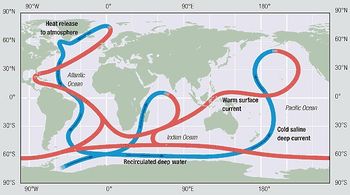Difference between revisions of "Template:This weeks featured article"
From MarineSpecies Traits Wiki
(Thermohaline circulation of the oceans) |
(→Thermohaline circulation of the oceans) |
||
| Line 1: | Line 1: | ||
==Thermohaline circulation of the oceans== | ==Thermohaline circulation of the oceans== | ||
| − | [[Image:Thermohaline.jpg|thumb| | + | [[Image:Thermohaline.jpg|thumb|right|350px|Fig.1. The Thermohaline Circulation. Source: IPPC 2001.]] |
The Thermohaline Circulation (THC) also referred to as the “Great Ocean Conveyor” or the Meridional Overturning Circulation (MOC), can be defined as the density-impelled circulation of the oceans. Thermohaline is derived from the Greek: thermo- for heat and -haline for salt, which constitute the density of water. The water masses transport both energy (heat) and matter (solids, dissolved substances and gasses) around the globe. Changes in the Thermohaline Circulation alter the global ocean heat transport and affect the global climate.(Broecker, W., 1991<ref>Broecker, W., 1991. The great ocean conveyor. Oceanography 1, 79–89.</ref>) | The Thermohaline Circulation (THC) also referred to as the “Great Ocean Conveyor” or the Meridional Overturning Circulation (MOC), can be defined as the density-impelled circulation of the oceans. Thermohaline is derived from the Greek: thermo- for heat and -haline for salt, which constitute the density of water. The water masses transport both energy (heat) and matter (solids, dissolved substances and gasses) around the globe. Changes in the Thermohaline Circulation alter the global ocean heat transport and affect the global climate.(Broecker, W., 1991<ref>Broecker, W., 1991. The great ocean conveyor. Oceanography 1, 79–89.</ref>) | ||
Revision as of 17:15, 8 July 2009
Thermohaline circulation of the oceans
The Thermohaline Circulation (THC) also referred to as the “Great Ocean Conveyor” or the Meridional Overturning Circulation (MOC), can be defined as the density-impelled circulation of the oceans. Thermohaline is derived from the Greek: thermo- for heat and -haline for salt, which constitute the density of water. The water masses transport both energy (heat) and matter (solids, dissolved substances and gasses) around the globe. Changes in the Thermohaline Circulation alter the global ocean heat transport and affect the global climate.(Broecker, W., 1991[1])- ↑ Broecker, W., 1991. The great ocean conveyor. Oceanography 1, 79–89.

